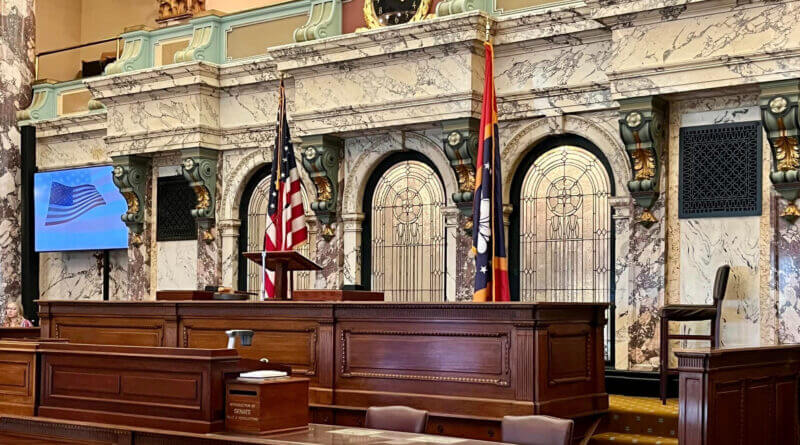Legislative Weekly Summary
Note: The Mississippi Senate and House of Representatives weekly provides DeSoto County News a summary of their actions during the past week. The following information is courtesy of the Senate and House Press Offices.
State Senate Weekly Summary
In the 11th week of the 2024 Legislative Session, the Senate passed Senate Bill 2628, that creates the Mississippi Capitol Region Utility Act; which would give a new authority the option to purchase the assets in the city of Jackson’s water system at the conclusion of the current court-ordered receivership. The authority would be run by a nine-member board of directors composed of three appointees of the governor, three from the lieutenant governor, two from the Jackson City Council and one from the Jackson mayor. The board would choose a president to run day to day operations and maintain efficiency. The purchase would occur once federally appointed system receiver Ted Henifin has completed his work and steps aside.
Passage of Senate Bill 2631, would make changes to the Mississippi Department of Agriculture and Commerce, including having the department obtain written approval of the Governor, Lieutenant Governor and the Secretary of State prior to entering any lease providing for naming rights of property.
Passing of Senate Bill 2132, would allow the Department of Human Services to establish a separate Child Support Unit authorized to withhold gaming proceeds of delinquent parents who are in arrears on payments. Those who earn gaming prizes at casinos of $1,200 or above, would have the proceeds deducted from wins and transferred to DHS to satisfy the amount they owe.
Senate Bill 2857, the medical cannabis act will allow the Department of Public Safety to access FBI databases for more vigorous background checks on applicants to the program.
Other bills passed included:
- Senate Bill 2853 would create the Mississippi Alcoholic Beverage Corporation to take over warehousing and distribution operations from the Department of Revenue once a new facility is operational.
- Senate Bill 2422, specifies judges who will hear election day disputes. “The list of judges selected to hear election day disputes shall be provided to the Secretary of State, chancery clerks and circuit clerks by the Chief Justice of the Mississippi Supreme Court no later than seven (7) days before the election in which the selected judges are to hear election day disputes.”
- Senate Bill 2406, would exempt certain private information from public records requests.
- Senate Bill 2544 would allow cities and counties to increase from two years to four years, an agreement with financial institutions handling taxpayer funds.
- Senate Bill 2145, Defending Affordable Prescription Drug Costs Act; would prohibit discriminating against 340B drug discount program entities. It would allow community hospitals to receive wholesale prices on top shelf prescription drugs.
- Senate Bill 2733, authorizes the Division of Medicaid to establish a wholesale prescription drug importation program, where prescription drugs could be acquired abroad.
- Senate Bill 2703, would require state agencies to report ransomware incidents and prohibit agencies from paying ransoms.
- Senate Bill 2244, would allow foster care children, their siblings, foster parents and biological parents free access to museums and state parks and allow free transcripts from colleges and junior colleges.
- Senate Bill 2268, establishes procedures for investigating missing or unidentified persons, including “Unclaimed human remains.”
- Senate Bill 2725, creates the “University System Efficiency Task Force” to examine the efficiency of the state public university system. It will investigate all aspect of universities effectiveness, including graduation rates, and the physical condition of campuses.
- Senate Bill 2311, allows county boards of supervisors to raise the salaries of sheriffs if they so choose.
- Senate Bill 2729 amended Rural Physician Scholarship Program and Rural Dentist Scholarship Program, to include an additional scholarship for a child psychiatry physician.
- Senate Bill 2776, allows the state to move forward with a technical point important to Project Atlas.
- Senate Bill 2651, revises fees and penalties for trespassing to hunt, fish, shoot or trap.
- Senate Bill 2549, increases fees for chancery clerks to record deeds to land sold for taxes and redemption of such lands.
- Senate Bill 2156, creates a Mississippi Rare Disease Advisory Council at University of Mississippi Medical Center that would bring together “professionals and persons living with rare diseases (who), could educate medical professionals, governmental agencies, legislators and the public about rare diseases as an important public health issue and encourage and secure funding for research for the development of new treatments for rare diseases.”
- Senate Bill 2871, ensures retailers and others cannot sell, give, barter, or deliver tobacco products to anyone under the age of 21.
All bills will be transmitted to the House for consideration.
The Senate met the Thursday, March 14, 2024, deadline for original floor action on general bills and constitutional amendments originating in the Senate, and the Friday, March 15, 2024, deadline for reconsideration and passage of general bills and constitutional amendments originating in the Senate.
The Senate faces a Monday, March 18, 2024, deadline to dispose of motions to reconsider general bills and constitutional amendments originating in the Senate.
House of Representatives Weekly Summary
This was the eleventh week of the 2024 legislative session. The House met as a whole throughout the week to discuss bills that made it out of committee and onto the calendar. Thursday, March 14 was the deadline for members to introduce and discuss these general bills. Any bills not discussed in session by this deadline died on the calendar. The bills discussed dealt with a variety of topics.
House Bill 1590 would reconstitute the membership of the board of the Public Employees’ Retirement System (PERS). The new board would be made up of the state treasurer, the commissioner of revenue, four appointees from the governor, three appointees from the lieutenant governor, one retired member and one current state employee. The bill would also rescind the scheduled employer’s contribution increase that was scheduled for July 1. An increase would be left up to the new board. The bill passed the House by a vote of 85-34 and has been sent to the Senate.
House Bill 1208 would provide for penalties for hunting and fishing on the lands of others without permission. The fines for this kind of trespassing would start at $500 for a first offense.
The bill passed 67-43 before being held on a motion to reconsider.
House Concurrent Resolution 23 would amend the Constitution to provide that only United States citizens are allowed the opportunity to vote. HCR 23 passed by a vote of 81-23 and will now be considered in the Senate.
Several Education bills were discussed this week including the following: the Students Safe at School Act (HB 1379); a bill transferring employment of student attendance officers from MDE to local school districts (HB 73); a bill to authorize the creation of virtual public schools (HB 1192); a bill creating a study committee (SAVED) to determine establishing a model school for failing schools in the Mississippi Delta (HB 1447); and a bill removing the requirement for the current district of a student to approve their release in the event of a transfer (HB 867).
Two bills would target telephone solicitors. House Bill 1350 would prohibit solicitors from making any calls regarding Medicare Advantage Plans. House Bill 1352 would prohibit any calls regarding Medicare supplements and would allow consumers to opt out of all calls. Both bills passed the House and have been sent to the Senate.
House Bill 1607, or the Women’s Bill of Rights, was a major point of discussion this week. The bill would provide legal definitions of “male” and “female,” “man” and “woman,” and “sex.” It would also ensure social or athletic groups could remain single sex. The bill passed 82-30 and has been sent to the Senate.
House Bill 349 would prevent “squatted vehicles,” where a vehicle is modified so that the front fender is raised four inches or higher than the rear fender. Proponents of the bill said that this would keep other drivers safe on the road because the driver of the modified vehicle cannot properly see. Opponents argued this was discriminating against individuals who participate in recreational activities such as car shows. HB 349 passed 75-43.
House Bill 430 would allow for direct sales and shipment of certain wines to Mississippi residents. After being held on a motion to reconsider, the bill passed 91-21.
The Walker Montgomery Protecting Children Online Act (HB 1126) was passed this week. The bill would protect minors from online harmful material and would require digital service users to register their age. The bill passed unanimously 121-0.
One representative presented a bill for the first time before the House. Representative Beth Luther Waldo (R – Pontotoc) presented House Bill 753, which would extend the repealer on the State Board of Cosmetology. The bill passed by a vote of 118-0.
After most general bills were taken up this week, representatives began working on appropriations bills. The appropriations bills determine how much money is given to various state departments and agencies.
The House is responsible for looking at the preliminary budgets of about 50 state agencies, including the Departments of Education, Transportation, Health, Medicaid and Human Services. These bills represent half of the state’s budget; the other half will be considered by the Senate and will be sent to the House for consideration later in the legislative session.
In the budget for the Department of Education (House Bill 1823), the House appropriated more than $3 billion for the implementation of the INSPIRE program, which was passed by the House last week.
Most budgets include reverse repealers, a clause that ensures that a bill cannot become law before going to a conference committee for further revisions. With reverse repealers in place, many appropriations bills were voted on in a block to help speed up the process. The deadline for original floor action on House appropriations and revenue bills is Wednesday, March 27.
The FY25 budgets for these state agencies are recommended by the Legislative Budget Office. These budgets will not be complete until the end of session when they go to conference committees.
Visitors to the Capitol this week included Main Street New Albany, Horn Lake Youth Council, the Medgar and Angela Scott Foundation, the Mississippi Coalition Against Domestic Violence, Jackson Young Lawyers Association and the Mississippi Reentry Coalition.






